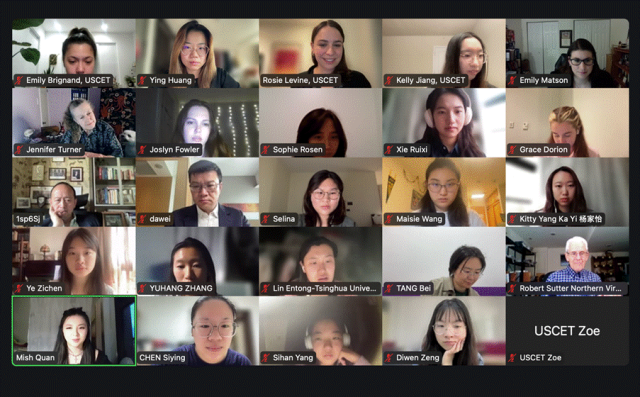The fourth plenary session of the second "Gen Z Dialogue: Finding Common Ground" series was held on April 26, 2025, from 8:00 to 10:00 AM Beijing time. Co-hosted by the Center for International Security and Strategy (CISS) at Tsinghua University and the US-China Education Trust (USCET), and organized by CISS Youth and the Tsinghua University Association for U.S.-China People-to-People Exchange, the event provided a platform for young people from China and the United States to engage in thoughtful discussions on pressing global challenges, including education, climate change, conflict resolution, and public health. The session was moderated by Rosie Levine, Executive Director of USCET, with opening remarks from Professor Da Wei, Director of CISS at Tsinghua University, and Professor Robert Sutter from the Elliott School of International Affairs at George Washington University.

During the session, each group presented its research findings and received feedback from experts and fellow participants. The Public Health team, represented by Zeng Diwen from Shanghai International Studies University and Grace Dorion from The College of William and Mary, explored the mental health experiences of Chinese students studying in the United States. Their research revealed that many students have never sought professional mental health support, due largely to the cultural disconnect between counselors and Asian international students. The group recommended using mental health apps and online services to help bridge this gap. Professor Da Wei encouraged the team to further examine how uncertainties in U.S. policy might exacerbate academic and visa-related anxieties among Chinese students, offering new direction for future research. The group emphasized their commitment to promoting culturally sensitive mental health support systems and noted the broader significance of their findings for improving international student well-being.
The Conflict Resolution group, consisting of Yang Jiayi from Tsinghua University and Joslyn Fowler from American University, focused their study on the ongoing war in Ukraine. They conducted bilingual interviews across time zones to gather youth perspectives on the conflict. Through this process, they investigated the role of economic interdependence, humanitarian assistance, and nuclear risk management in easing tensions. Their findings suggested that China and the United States, despite their differences, could collaborate by maintaining strong economic ties to avoid further destabilization, taking the lead in humanitarian efforts such as food security and refugee support to build mutual trust, and improving crisis communication and multilateral dialogue mechanisms to reduce the risks of nuclear escalation. While the two sides emphasized different concerns—U.S. participants focused more on global stability and geopolitical dynamics, while Chinese participants stressed humanitarian and nuclear safety—they shared a common understanding of the importance of cooperation, negotiation, and interdependence. The group compiled a bilingual report and produced a video to share their insights. They expressed a strong belief in the power of dialogue and pledged to continue spreading their message across universities and international platforms.
The Education group, represented by Xie Ruixi from Tsinghua University and Sophie Rosen from The College of William and Mary, examined how students in China and the U.S. understand major historical events. Using surveys and literature analysis, the group compared the knowledge and perspectives of students in both countries. They found notable differences that appeared to stem from variations in curriculum content and teaching methods. Nonetheless, students from both sides shared a desire to learn history from multiple perspectives and believed this approach fosters a more comprehensive and objective understanding. The group suggested that educators from both countries strengthen collaboration to share teaching methods and jointly cultivate historical literacy and critical thinking skills. The team also highlighted the vital role of people-to-people exchanges in sustaining bilateral relations, especially during times of diplomatic tension. They argued that public diplomacy possesses a resilience and autonomy that can make it especially valuable in maintaining peace and cooperation when official channels face challenges. Looking ahead, they plan to continue their research and contribute to educational exchange efforts between the two countries.
The Environment and Climate group, represented by Chen Siying from Beijing Foreign Studies University and Mish Quan from George Washington University, shared findings from recent surveys that revealed growing awareness among students regarding energy conservation. For instance, a large proportion of respondents reported taking simple steps such as turning off water while brushing their teeth. However, there was still room for improvement in areas like air conditioning usage and awareness of electricity costs. The group found that many students expressed a strong willingness to participate in sustainability projects on campus, laying a promising foundation for future initiatives. Drawing on existing platforms such as the U.S.-China Clean Energy Research Center (CERC) and the Global Alliance of Universities on Climate (GAUC), they discussed ways to enhance collaboration between universities in areas such as data sharing, technological development, and student engagement. They also shared insights from an interview with Professor Hou Jing of Tsinghua’s School of Environment, who emphasized that reducing emissions is not just a technical issue but also a matter of shifting values and cultivating sustainable habits. Their faculty advisor, Professor Jennifer Turner, praised their thorough research and commended the students’ sense of responsibility and practical engagement. She encouraged them to continue approaching energy transformation with an interdisciplinary lens and to develop concrete strategies for behavioral change, transparency, and policy incentives.
As the fourth plenary session concluded, so too did the second "Gen Z Dialogue: Finding Common Ground" series. Looking back on the journey, each group demonstrated that even in an uncertain international climate, young people from China and the United States can work together with sincerity, professionalism, and a shared commitment to understanding. It is hoped that this spirit of mutual respect and cooperation will continue to flourish and lead to new opportunities for building a more sustainable and peaceful future.
